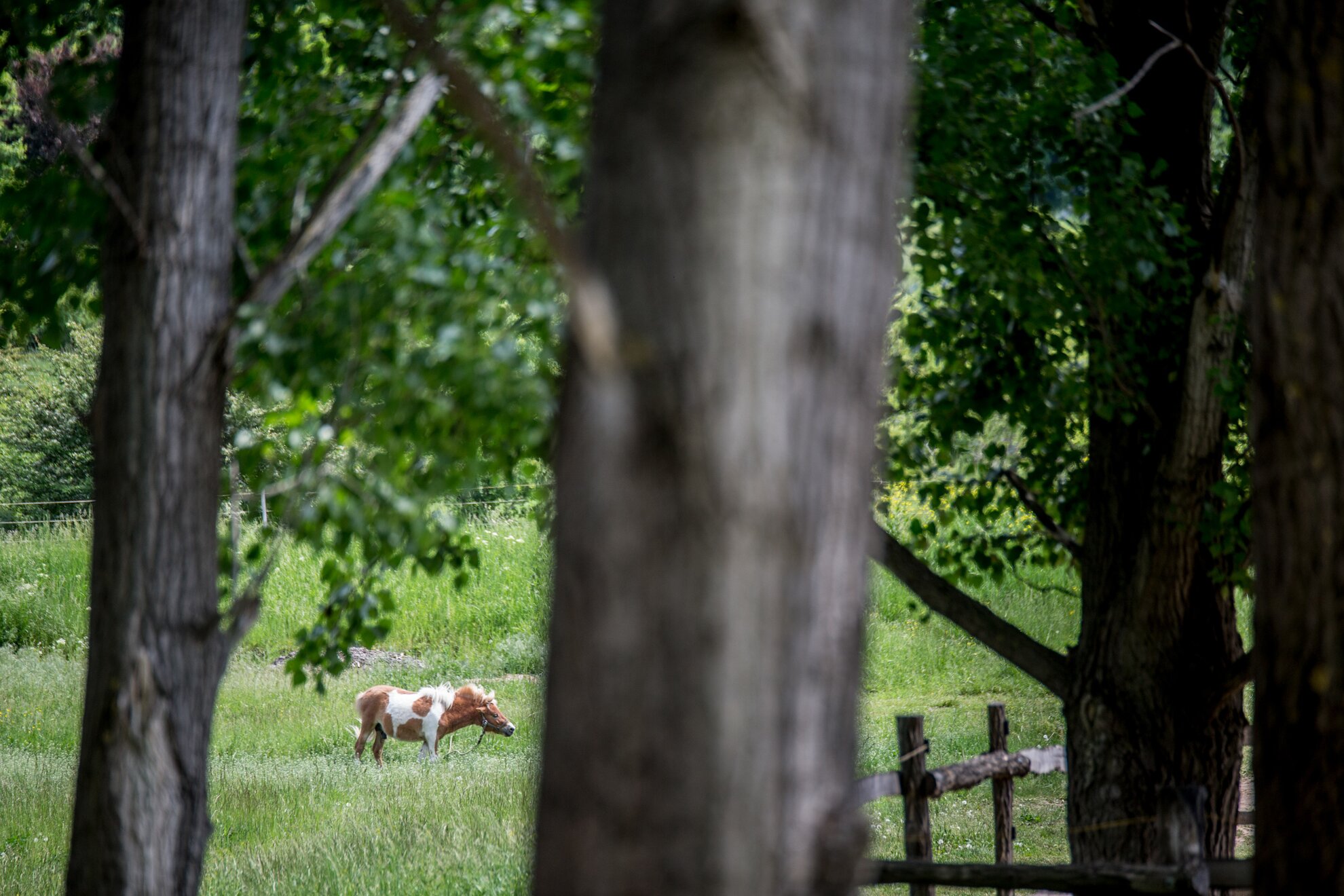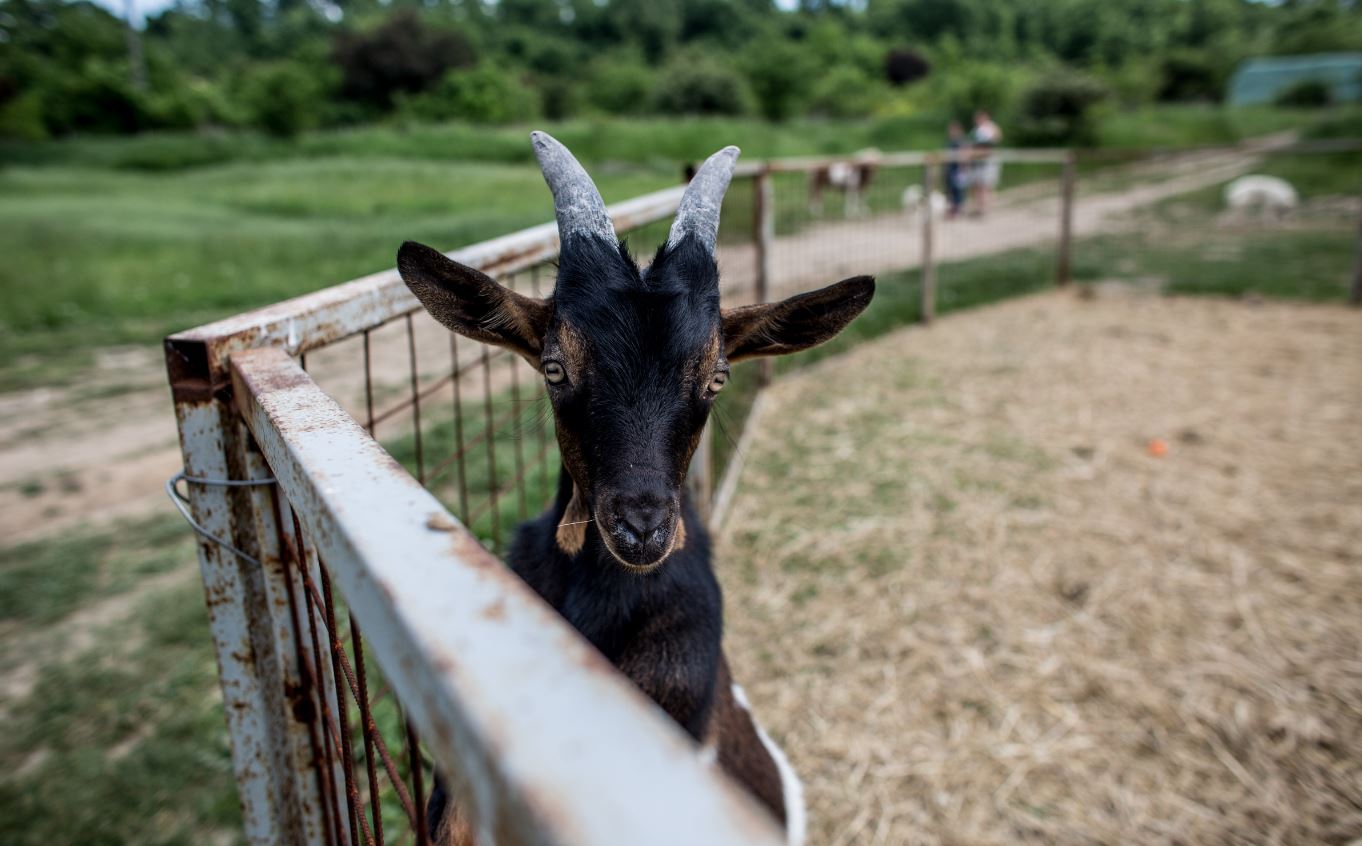Arriving at this friendly farm in Törökbálint, we are welcomed by a massive dog who gently leans against our legs to seek attention; this is where Anita Herczog and her family live with three children, 80 goats, free-range birds, sheep, pigs, a pony, and a horse, all on a farm a few hundred meters from here.
This farm is open all day to everyone who would like to pet the animals, and unwind amid a rustic atmosphere. Appointments only have to be made for the evening milking. Excluding open days, there is unfortunately not really a chance for a guided tour due to the great number of duties, although it is truly worthwhile to meet Anita and listen to her stories. And we are not talking about such – seemingly obvious – topics like that even nannies have horns, and that goat milk and cheese do not always have an unpleasant goat smell. However, definitely bear in mind that those who decide to keep animals make a huge scarifice of their free time. Anita and her family work 16 hours a day, seven days a week, all year long.
The family and their staff – a couple – do pig slaughtering from the beginning of November to the end of February, making meat produce, hams, sausages, and cold cuts, while from the end of February till the end of October the cheese business is at full blast, as this is when the goats give milk. Last year they won gold and silver medals for their cheeses, for instance, for a snack filled with garlic cream cheese.

Anita, who was originally an economist, and her partner, a locksmith with a degree in agronomy who also worked in hospitality, decided to keep goats at Biatorbágy – a town in the Budapest metropolitan area – after the birth of their first child. “It didn’t take too long for us to realize that there was so much work around these animals that it really didn’t matter whether we had 4 of 14 of them,” said Anita, who was also encouraged to make this choice by the dilemma of deciding what to feed to her children. “You can’t really buy decent food anywhere, and who says otherwise simply lies. It is not necessarily any better at markets either.” She is disenchanted by farmer’s markets, because she doesn't like that they are full of vendors who do not even sell their own produce, so Anita’s homemade goods are not even available at these markets. “If you go to a farmer’s market, always ask whether you could go and check out their farm and the animals. If they say no, that is really suspicious,” she advises.
Arriving at the goat pen we see a four-year-old Alpine billy goat called Rudi or Sátánka (translating to “little devil”), who is the “man of the manor”. He pastures while tied up, separated from the others, and he will only be allowed to enjoy the company of the others after August 20th, but then, the 80 ladies of the farm will make up for these long lonely months… This is their mating period, and Rudi is normally so busy at the time that he doesn’t even eat. However, he is highly respected: the farm reminisces about the billy goats of the past nine years; their skulls decorate the walls inside the barn.

We came during siesta, as between 1pm and 3pm the nannies and their babies are back at home in the barn. Cili, Pannika, Szeder, Valentin, Cumis, and the others all surrounded us curiously. “Watch your notebook!” Anita warns us, as they quite like to chew on paper. They even tried their luck with our backpacks.
“A teacher can also tell their pupils apart,” says Anita when we ask how she remembers all these names. There is one goat identified by a bell, as that one is a true wanderer. During a day, the animals normally walk about ten kilometers around the 40-hectare-large pasture, but they are only allowed to go until the edge of the forest, as they like chewing on saplings, and the forest ranger is really not happy about that. Since they pasture at eye-level, contrary to common belief they are actually not suitable for grass-cutting; sheep are better animals for that – and this is why they keep them – but they really need fleecing. A few years ago there was a thorn tree in the place of the pasture, but the goats have trimmed it down a bit over the years, so now they can comfortably stroll around. When they cannot go outside they are fed high-quality hay and lucern.

The goats all have personalities; they are jealous, and often seek attention and petting. They chew on everything they find, but Anita thinks they are smart animals. “They are like naughty kids; they know exactly what they can and cannot do, and obviously do what is not allowed.” One of them was once found on the roof eating the tiles. It is a true mystery how he made it up there, although it was quite possibly with the help of a nearby tree.
After their siesta, the goats go back outside until 6pm, and they get milked afterwards – and also between 6am and 8am. Curious visitors can join the milking in the evenings. “Last week we had a birthday group of 11-year-old girls visiting, and they were truly enthusiastic,” says Anita. “I often say that we are even better than Playboy; there are a total of 60 boobies here every day, all different shapes, and it is not only possible, but compulsory to touch them,” she laughs.
People are always welcome to have a wander around. They often hold open days and cheese-making workshops, after which they also show everyone around the farm. There are many people who keep coming back afterwards on their own. For instance, in February lots of babies were born, and they needed a number of volunteers to help carry the water, as during that time the nannies were enclosed with their babies, and had to be fed individually. However, they mostly need petting, which is a soothing and elevating experience.
Furthermore, there are several other animals here as well, such as Muki the pony, a horse who was bought here instead of the slaughterhouse, kittens, chickens, chicks, pregnant sows, and emasculated boars, who are unfortunately only here until the end of October, when they are sent to the otherworld for their meat. We found out from Anita that they need to be emasculated because otherwise their meat becomes quite smelly. They also keep indigenous blonde mangalicas. We also found out that if we decide to keep goats it is worthwhile to keep pigs as well, since the pigs love whey, which remains after milk curdles, mixed up with some bread.

In the petting zoo we also find an orphaned pygmy hog who was given away by a family, as well as billy goats who don’t go out as they cannot give milk. Unfortunately, they will be eaten. “We really have to keep some distance. They are delicious, but I feel truly sorry for them,” confesses Anita. She had been a vegetarian for years in order to protect animals, but she had to reconsider this lifestyle when she became pregnant. “Animals who give milk are also exploited, and hens are not too lucky either. It is not great to be a carrot either, but we really need to eat something. I eat meat, but I respect these animals enough to keep them in good care, and when I kill them it is in the most merciful manner.”

At pig-slaughtering events and team buildings held on the farm, only those who wish to be present at the actual killing have to be there, as the animal gets brought back to the house afterwards. However, sometimes there are still some surprised urban faces – people don’t like knowing how meat is made. “A company comes for a pig slaughter, the girls freak out, but then stuff themselves with sausages. We are pretentious; we are taught to feel sorry for these animals, and do not wish to see or know what happens to them, as what we do not know does not hurt,” says Anita. They sell various kinds of pig produce, sausages, cold cuts, hams, smoked ham, homemade pig fat, fresh goat milk, and endless cheese variations that we even tasted upon our visit, and were truly surprised by the absence of that unpleasant goat smell. Anita says that the smell only forms if the milk is left to sit for too long, or if the animals mate, but otherwise it is not characteristic. The products can be purchased at the farm, and they also do home deliveries every second week. There is no delivery fee, but the minimum order is 4,500 forints.
The legalities of keeping animals are pretty favorable; we can basically keep animals anywhere. It is another question when the neighbor keeps nagging the local authorities until they forbid it. "Even though we live in the countryside, commuters to Budapest want to make life here feel exactly like in downtown, but with more silence; no animals, no flies, no smells. They can be really surprised that we have the right to keep animals,” says Anita.

However, being so close to Budapest is a big advantage, as it ensures a market; if they lived in the countryside, the business would be more difficult. “Basically I would make more money per hour at any of the McDonald’s joints,” says Anita about money issues. It is never going to worth it financially, but they are happy about not having to pay for the farm’s operation anymore. “Now we get hay and straw on the cuff, and finally managed to pay off our debts from last year. This is huge progress,” she adds.

Over the past nine years they only went on holiday once for two weeks in Greece, as they do not like leaving the farm unattended. They prefer going to Lake Velence near Budapest, and keep coming back in turns. Despite all the sacrifices, this lifestyle is worth the hassle, and Anita told us why: “You do something you love, and do not just sit around in an office. If in ten years’ time we see that this doesn't work out after all, at least I can say that my children grew up nicely among animals. This is something that money can’t buy.”
How to get there:
As this Goat Farm is found in Törökbálint – a suburban community just southeast of Budapest – the easiest way to visit is to take a car, as the road is easy to follow. From Budapest, take the M7 motorway towards “Horvátország, Szlovénia, Nagykanizsa, Balaton, Székesfehérvár”, and take exit 18 towards Érd. From here, turn onto “Iparos utca” and turn right at the end of the street. Head right at the fork, and after a sharp left turn you will reach your destination. See a detailed map here.
Kecskevilág
Address: Törökbálint 2045, Idamajor
Facebook




